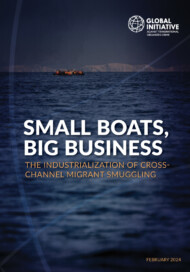Posted on 23 Jan 2025
Tackling migrant smuggling has been one of UK Prime Minister Keir Starmer’s priorities since taking office in July 2024. The prime minister has repeatedly vowed to ‘smash the gangs’ who are using small inflatable boats to smuggle migrants across the Channel to the UK. To this end, the UK government has pursued a coordinated and strategic approach of pressure across the smuggling supply chain. Smugglers have been imprisoned in the UK; UK law enforcement officers, in cooperation with Bulgarian authorities, have intercepted boats and other equipment used for smuggling in Bulgaria; and a security agreement has been struck in Iraq to target people smuggling gangs, leading to three arrests in Kurdistan in January 2025. Germany also revised its law to make it easier to prosecute smugglers and the UK has imposed sanctions on entities associated with smugglers.
But the business of migrant smuggling is changing too. Our 2024 report ‘Small boats, big business’ revealed how cross-Channel smuggling had industrialized, largely down to the control of Kurdish gangs. Profiting from economies of scale, smugglers began recruiting migrants in large numbers in origin countries with full-package deals (in which smugglers handle the logistical arrangements for the whole journey), as well as providing passage on a boat for migrants who arrive independently at the northern French coast.
Despite attracting increased attention from law enforcement, the flow of migrants to the Channel coast has remained strong, and the demand for smuggling services is now changing ways in which the industry operates. The market is seeing the emergence of start-up smugglers, specialized support roles and opportunists, as everyone attempts to get in on this lucrative industry.
‘Small hands’ make a grab
One of the recent trends has been the rise of ‘small hands’ – migrants who recruit others for the smuggling gangs, helping them fill the boats in exchange for free passage at a later date. Hired for their language skills, they recruit migrants of their own nationality or ethnicity. The ‘small hands’ also know the crossing points from the French beaches, and work in groups to prepare and launch the boats.
These middle men in the supply chain have started to charge for their service – a fee of between €1 000 and €1 500 for each boat that leaves the French shore. With up to four hands working on a boat, this is an additional cost for the smuggler of up to €6 000 (on condition that if the boat is intercepted no payment is made). The hands sometimes recruit a third person to act as ‘security’, for which they are paid €200 to €500, or a free passage on a boat crossing after they have worked some shifts. The hands are also not averse to making some extra cash by adding their own clients to the boats, who pay them directly. Some large smugglers have discovered that a boat they had originally planned to accommodate 50 passengers launched with 70.
In a good month, the hands can earn between €5 000 and €10 000 by acting as the smugglers’ factotum. This kind of money is an incentive to stay at the French coast rather than take the risk of crossing to the UK, where they may expect to do arduous, low-paid work.
The ambitious among them have sought to take advantage of their know-how, cash and connections to chance their hand launching their own boats. For this, they turn to another type of specialist: the boat suppliers. A phone call can secure a would-be smuggler a boat, life jackets and fuel for between €9 000 and €12 000. Other groups deliver the boat for another €3 000 to €4 000.
For those striking out as nascent smugglers, the risks are as a high as the rewards. A small hand-turned-smuggler can make a fortune by dispatching one or two boats, but if the next one is intercepted by the French police, they can lose their entire capital. Like any casino, some choose to leave the game at this point. We heard of one who returned home to Kurdistan. But others stay at the table hoping to win back their losses.
‘Zig-zag’ brokers
The wealth profile of the migrant clientele on the French coast is diverse. For those with the means, some smugglers charge high prices for the crossing. Increased law enforcement pressure had the effect of raising the cost of acquiring boats and engines, and prices reportedly quadrupled to around £6 000 (€7 000) in mid-2024. However, other smugglers have developed low-cost options for poorer clients (for example, Sudanese and Eritreans), who are offered passage for between €900 and €1 100. To make up the margins, smugglers may load the boats with more low-paying customers, although mixed price boatloads are also known. But for those migrants, generally from sub-Saharan Africa, who cannot afford the crossing even at a low fee, there is still hope in the shape of what are known in local jargon as ‘zig-zag’ brokers. For a fee of €100 to €400, these brokers take a migrant to a point on the coast where a boat is being prepared for launch, so that the migrant can attempt to board it, by force if necessary, without paying the fare.
The migrants already on board often have little option but to comply. We heard that some Sudanese migrants have threatened to destroy the boat if they are not allowed to board. Unfortunately, the result of overloading these small vessels is often tragic. On 23 April 2024, a seven-year-old girl died of suffocation in Wimereux after between 40 and 50 Sudanese stormed onto a boat, bringing the passenger count to 112. The brokers rarely face retribution for their part in endangering the passage, as the Kurd smugglers will not recognize who is who among the sub-Saharan African migrant population, and so cannot take revenge.
Still a booming trade
Despite the ramped-up law enforcement efforts, migrant crossing numbers in 2024 were the second-highest on record. With so much money to be made, it is unsurprising that everyone is trying to get their slice of the pie. The volume of trade appears to be enabling the emergence of a new class of small smuggler to emerge, without repercussions from the large players. This may be because a handful of extra crossings do not seriously impact the main smugglers’ business, or perhaps the large smuggling rings know that these new entrants rarely have the financial depth to stay in the business long and outlast the inevitable loss of boats. Similarly, the presence of brokers does not appear to be leading to increased security hired by the smugglers to prevent dangerous overloading at the launch sites.
Overall, the industry may be experiencing a period of debundling, where specialist service providers establish themselves and new entrepreneurs attempt to set up shop. But this fragmentation is not a sign of an industry in crisis; rather, it speaks to the flexibility and rapid shifts in the illicit market, underpinned by the pursuit of profit. And as the data highlights – 2024 was the deadliest year for recorded migrant deaths in the Channel (77 are known to have died) – criminal profit is coming at ever greater cost to migrant safety.



